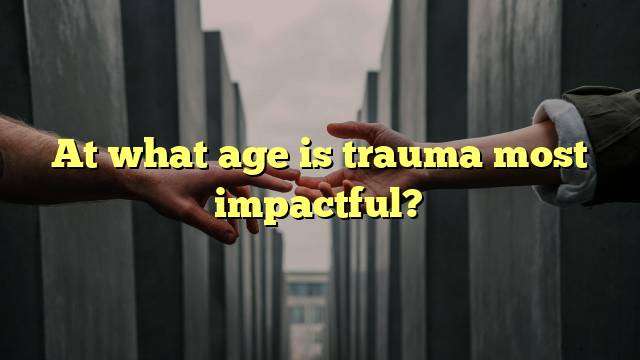At What Age is Trauma Most Impactful?
Trauma, whether experienced on an individual basis or through larger-scale events, can have a profound effect on a person’s development. Knowing how and when trauma affects individuals can help inform prevention and treatment strategies. A recent study has identified that ages 5 through 8 are a crucial period in terms of the psychological impact of trauma on children.
The Impact of Stress on Brain Development
The human brain is incredibly malleable during childhood and adolescence, with the majority of development occurring between the ages of 5 and 8. During this period, the brain is especially sensitive to environmental conditions, including the presence of stress. A study by the National Institutes of Health (NIH) has shown that exposure to traumatic events during this period can have lasting psychological repercussions.
The study found that during the ages of 5 to 8, traumatic events such as physical or sexual abuse, bullying, witnessing violence, or experiencing the death of a loved one can alter the way the brain develops. This can result in long-term changes in behavior and emotional regulation, as well as increases in the risk of mental health problems later in life.
The Effects of Trauma on Emotional Development
The NIH study also found that exposure to traumatic events during the ages of 5 to 8 can have a significant effect on the way children develop emotionally. Children who experienced trauma during this period were more likely to have difficulty regulating their emotions, which can lead to problems with anger and impulse control.
The study also found that children who experienced trauma during this period were more likely to be diagnosed with anxiety and depression later in life. This suggests that exposure to trauma during this critical period of development can have a lasting impact on mental health.
The Impact of Early Trauma on Learning and Memory
The NIH study also found that exposure to trauma during the ages of 5 to 8 can have a significant effect on the way children learn and remember information. Children who experienced trauma during this period were more likely to have difficulty learning new material and retaining information. This can lead to problems with academic performance and difficulty in school.
The study also found that exposure to trauma during this period can have an impact on executive functioning, which is the ability to plan, organize, and remember information. Difficulties with executive functioning can make it difficult for children to stay organized and focused, which can lead to poor academic performance.
The Impact of Trauma on Social and Interpersonal Skills
The NIH study also found that exposure to trauma during the ages of 5 to 8 can have a significant effect on the way children develop socially and in terms of interpersonal skills. Children who experienced trauma during this period were more likely to have difficulty forming and maintaining relationships, as well as difficulty managing their emotions in social situations.
The study also found that exposure to trauma during this period can have an impact on the way children interact with others. Children who experienced trauma were more likely to display aggressive behavior, as well as be more withdrawn and less likely to engage in social interactions.
Conclusion
The recent study by the National Institutes of Health has identified that the ages of 5 to 8 are a critical period in terms of the psychological impact of trauma on children. Exposure to traumatic events during this period can have lasting repercussions, including difficulties with emotional regulation and learning, as well as social and interpersonal skills. Knowing about the impact of trauma during this period can help inform prevention and treatment strategies, as well as ensure that children receive the support they need to develop into healthy and resilient adults.



